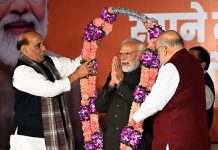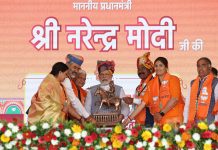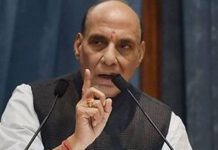When Chhavi (name changed) came to the capital for the first time in 2005, to study in a Delhi University college, there were some unspoken rules that her family back home in Saharanpur expected her to abide by. Though
nobody in her joint family had spoken to her on the subject, she was well aware that she was, under all circumstances, not supposed to fall in love with anyone. She knew very well that she had been sent to the city to get a good education and that she might be allowed to work too for a few years. It was just a matter of time that her parents would arrange her marriage in her early twenties to a young man of their choice.
And that is, somewhat, how things went by. “I was a few months shy of eighteen when I joined Daulat Ram College. I was allowed to apply for admission only in girls colleges as my family was wary of me being influenced by co-education. They didn’t even let me stay in a paying guest accommodation fearing that I would get out of their control. So I stayed for three years of my graduation in the college hostel that was very strict about timings. We were not allowed to step out after 8 PM. The warden dint even let us keep mobile phones, can you imagine?” said Chhavi, who is now 30 and mother of a three-year-old.
It wasn’t that Chhavi dint fall in love. She did, and very much in love indeed. “During the first year of my college, I was quite shy and stayed away from boys. But by the end of second year, I had a boyfriend. He was a classmate’s school friend.” After graduation, Chhavi enrolled in a year-long post-graduate diploma course in advertising and public relations at a polytechnic and thereafter got a job in Delhi itself. “By that time my boyfriend and I had fallen in love and wanted to get married in the near future once our careers were stable. But my family was trying to arrange my marriage and I got goosebumps every time I felt the need to tell them about my relationship. I was afraid they would never agree,” she said.
Chhavi consulted an elder cousin sister who suggested that she tell her parents and see how they reacted. “So I told my mother, who was very upset with me and made me feel guilty for betraying her trust. She was dead against my relationship and accelerated all efforts to find a suitable boy for me. Thankfully, she dint have the courage to tell my
father fearing that he would be very hurt. So I continued to live in Delhi. What worked in my favour was that my parents couldn’t find a suitable match for me even when I turned 26, which was considered to be quite past my marriageable age. They were getting restless. Finally, my father got to know of my boyfriend and they agreed to get us married.”
As an afterthought, she added, “Both of us belonged to the same kayastha caste, so it made things easy. My family was happy about that. I don’t think they would’ve let me marry him had he been from a different caste. Also, my parents told most of our relatives that the marriage was arranged by one of our distant relatives. They were embarrassed to tell people that their daughter was having a love marriage, even though it was in the same caste.”
Chhavi’s story might sound a bit absurd to some, but her circumstances are definitely understandable for a large number of young men and women in our country where love and marriage are contentious issues even in the twenty-first century. Since time immemorial, India has been obsessed with marriages that have been the centrepiece of our society. Across states and cultures, parents and relatives constantly have the marriages of the families’ youngsters on their minds. And marriages in the country are carefully curated, taking into consideration not only the bride and the groom but also their families and communities.
Love Marriage vs Arranged Marriage
There was a time when only ‘arranged marriages’ were the norm and ‘love marriages’ were frowned upon. People who were to be bound by marriage and expected to spend their entire lives together saw each other just once or twice before the wedding day, and they would not know much about each other. In the twenty-first century, arranged marriage has gone through superficial changes in urban settings even as, in various social set ups, it continues to be the same old ritual of getting two strangers married. However, even though love marriages have become more common and acceptable, archaic rules concerning love and marriages — especially of caste and religion (apart from class) — still rule the roost. Despite the progress on the fronts of education, technology and the economy, India as a collective society continues to be conservative when it comes to culture and social norms.
Talking about ‘love’ marriage, according to Dr Aardra Surendran, Sociologist and Assistant Professor at the Tata Institute of Social Sciences (TISS), Mumbai, “The entry of personal choice has been recent in the history of marriage as a social institution across cultures, and particularly so in India. It has been governed by the existence of caste and kinship structures. These norms may vary across regions and social groups across the country, but norms exist, and marriage outside of these norms is frowned upon even today in almost all regions.”
Dr Surendran also says that the mingling of men and women from the perspective of attraction or love is seen as undesirable across cultures in India. “We may observe some superficial change in urban settings, owing to the increased presence of women in the public sphere, be it educational or work place locations, but the element of choice even in these settings is accepted only if carefully calibrated along religious, caste and class lines. Love has rarely been the operative element in deciding who to marry, and choice, particularly of the woman, has rarely existed in socially prescribed settings,” she told Tehelka in an interview conducted via email.
It is true that the mingling of young men and women is considered taboo and discouraged in most parts of the country. Recently, a local Haryana newspaper uploaded a video on its Facebook page, that went viral, speaking volumes about prevalent attitudes in the country against friendships between men and women. In the video, a person identifying himself as a lawyer practicing in the Delhi high court intervened when security persons and policemen in a public park asked a young man and woman, both adults, to give their parents’ contact numbers so that they could be made aware of what their children were upto. The lawyer could be heard making the cops aware that it wasn’t a crime for two adults to walk together in a park.
In Uttar Pradesh, the ‘anti-romeo squads’ that were set up in 2017 by the Yogi Adityanath-government to protect women from being harassed saw self-styled vigilantes or ‘moral police’ often objecting to men and women hanging out in public places out of choice. Several men were put behind bars and no one knows if they had harassed women of were simply present at public spaces with their female friends or girlfriends.
Ten youths — four boys and six girls — hailing from towns and small cities in different parts of the country, that this correspondent spoke to, all said that the mingling of adolescent and teenaged boys and girls is usually disapproved of by teachers, school administrations, parents and people in general who encourage youngsters to make friends of the same gender only. All of them also said that though caste and religion shouldn’t matter, they are significant factors today even when it comes to ‘love marriage’.
Dr Surendran further said that it might be premature to judge that choice-based marriages are easier in the urban areas. “While more instances of choice based marriages are observed in urban areas, the general proscription against choice, especially if it implies a marriage outside community or caste backgrounds, exists even in urban areas,” she said.
Caste and Religion Still Matter
Recently, 23-year-old Ankit Saxena was stabbed to death by the father of his girlfriend who was from another religious faith. The fact that this incident took place in the national capital speaks volumes about the state of affairs in the rest of the country. Marriages in our country have always been arranged keeping in mind strict caste considerations.
Dr Surendran points out that “falling in love is often seen as a transgression of carefully guarded caste and community lines. Contemporary instances of violent repercussions to choice based marriages are cases in point, as they are seen as challenges to social order.”
This is certainly evident from the hounding of couples, who cross the limitations of caste and religion, by khap panchayats in a few north Indian states and right-wing groups across the country. Every now and then there are cases of diktats issued against young men and women who dare to choose love over the shallow honour of their communities. There have been multiple reported cases of honour killings by families who believed that their children brought them unacceptable shame by marrying someone from another caste out of their own personal choice. Across India, caste considerations in marriage and friendships have always been significant. Chhavi’s case is just one among a large number of relationships when castes of the man and the woman play a crucial role in their marriage, often becoming an obstacle in the couple’s relationship.
The Supreme Court had in January reprimanded khap or community panchayats for passing their own illegal communal orders against inter-caste marriages of adults. “What we are concerned about is that when an adult girl or boy gets into marriage, no khap, no individual or no society can question them. Whenever there is any kind of collective attack on a boy or a girl, who are adults, it is absolutely illegal,” the apex court had said.
The Love Jihad Fiasco
The going gets tougher for couples when it comes to inter-faith marriages. There is ongoing propaganda against inter-religious marriages, especially when the woman is Hindu and the man a Muslim or a Christian. Cries of ‘love jihad’ have been doing the rounds in every case where a Muslim has married a Hindu. Let us assume, for the sake of being open to dissenting opinion, that there could be the possibility of a secret campaign to convert vulnerable Hindu women to Islam or Christianity. However, even then, there are several instances of women, and men,
being happily married to partners from other religions without changing their faiths.
College sweethearts Kritika Mathur and Sharif Qamar got married in 2015 under the Special Marriage Act, 1954, that allows inter-faith court marriage without either spouse having to change his or her religion.
 “My parents were not too happy about our relationship but they weren’t against it either because they knew that my happiness depended on it. However, Kritika’s mother was quite vocally against our plan to get married,” Qamar, currently working with The Energy and Resources Institute (TERI), told Tehelka. After the couple convinced both families to accept their union, they decided to get married in court and then throw a reception, rather than perform any religious wedding ceremonies.
“My parents were not too happy about our relationship but they weren’t against it either because they knew that my happiness depended on it. However, Kritika’s mother was quite vocally against our plan to get married,” Qamar, currently working with The Energy and Resources Institute (TERI), told Tehelka. After the couple convinced both families to accept their union, they decided to get married in court and then throw a reception, rather than perform any religious wedding ceremonies.
“From the very beginning, no body in my husband’s family expected me to change my religion. In fact, they were as accepting of me as they would be of a girl from their own religion,” said Mathur, who teaches Finance and Economics at Ambedkar University in New Delhi. “We now have a little daughter who we have named Ayesha, which is both a Hindu and a Muslim name. Both of us follow our religions as we desire — I have a small temple in our house and read the Gita daily; he tries to go for Friday prayers whenever he can. My parents are more than happy now,” she added.
When asked if religion plays an important role in marriage, NRI Dr Arfana Ahmed Kishan told Tehelka that religion is personal to every individual and marriage is about accepting differences beautifully. She was born and raised a Muslim in Hyderabad and had left home over 25 years ago, at the age of 23, to get married to a Hindu man of her choice. “My parents were dead against our relationship. After we got married, even his parents didn’t accept me as I wasn’t a Hindu. Our marriage dint work and we ultimately got separated and divorced after having two children but that dint really have anything to do with the fact that our faiths were different,” said Dr Ahmed Kishan, who is a medical practitioner based in North Carolina, USA. She continues to use her husband’s name as surname because it is mentioned in her Indian passport and she doesn’t want to complicate things.
The popular case of Hadiya, a young adult who converted to Islam and then married a Muslim man, is an interesting case study of the ongoing campaign alleging ‘love jihad’. The Kerala high court as well as the Supreme Court had both cast aspersions on the adult woman’s decision to convert and marry. There was also a National Investigation Agency (NIA) probe to find out if she was coaxed into converting to Islam for marriage. Finally, the apex court recently realised that Hadiya, being an adult, had the individual autonomy to take important life decisions herself.
Women Bear the Brunt
Another glaring fact about love and marriages in our country is that women are certainly more suppressed than men. Thanks to our patriarchal and feudal mindsets, women are considered to be the beholders of their families’ honour, like property, rather than personal entities with their own desires and rights. Today, in both urban and rural set ups, women’s lives are scrutinised and their characters questioned especially when it comes to being around members of the opposite sex and choosing their own life partners.
Agreeing that perceptions in India against falling in love are stricter for women than for men, Dr Surendran pointed out, “Historians and anthropologists have explained the control of female sexuality as the key element in the development of prescribed norms on marriage. Female sexuality is seen as the locus of family honour, and providing the woman the agency to choose her partner is seen as destabilizing this carefully maintained normative order, which is also pivotal in maintaining other hierarchies.”
She added that violent “repercussion is much higher if love or marriage is between a woman who belongs to a ‘higher’ caste or ‘majority’ community and a man who belongs to a lower caste or minority community. This in turn is because it is assumed that marriage implies a subsumption of the woman’s identity into the man’s family, and hence the dilution of purity or superiority of dominant identities or groups.”
Even as more and more youngsters are having pre-marital sex today, norms pertaining to women’s sexual choices and virginity continue to be primitive.
Recently, three men were thrashed by a caste panchayat in Pune for starting a campaign to stop an archaic practice of conducting ‘virginity tests’ on brides on the first night after marriage. According to news reports, as per the practice, a newly-wed couple is handed a white sheet on their wedding night to use during sexual intercourse. The next day, the caste panchayat along with others from the community ask the groom: “Was the bride ‘fine’?” To indicate that the bride was a virgin, he is required to say thrice: “maal khara (good product).” If not, then the bride is questioned about who she lost her virginity to and then the both are asked to pay a ‘penalty’ — mostly monetary, varying from woman to woman.
Author Ira Trivedi, in her book India in Love — Marriage and Sexuality in the 21st Century (Aleph) points out that India is going through a ‘love revolution’.
“By spending so much time in different parts of India, with so many different kinds of people, I discovered a fundamental change that India was going through,” she writes in the book that was first published in 2014. “The love revolution will lead to the breakdown of the traditional arranged marriage. This is significant because it also means the breakdown of the joint family, of caste and community identity, and as divorce rates skyrocket, perhaps also of marriage itself. This switch from arranged to love marriage will be a slow, gradual one, but it is happening nonetheless, particular in urban India. The India of ten years ago was substantially different from the India of today, and the India a decade from now will continue on the path that we have paved.”
After travelling to dozens of towns and cities across the country, she also writes that there is also a ‘sexual revolution’ going on simultaneously with the ‘love revolution’. “We are on our way — however slowly and treacherously — to greater sexual openness, tolerance and freedom… there is an eternal war between social conservative prudes and a new generation of Western-influenced young people… India has a strongly set culture of family and kinship, and it’s impossible to remove it all in one, two or three generations. Society is changing and a lot of our old ideals are being questioned. An important point that I discovered for both revolutions is that they were happening at different speeds in different ways across the country,” Trivedi writes.
It is indeed true that family ties are intrinsic parts of the lives of Indians. A lot of youngsters are either influenced by their parents or do not want to be insensitive to them when it comes to taking important life decisions. As a consequence of better education, technology and globalisation, a large part of today’s youth thinks differently from their parents, which can be called a wide generation gap. But deep-rooted family ties and cultural values also make them think like their parents on many issues. There is a never-ending battle between deep-rooted farcical traditions and contemporary pragmatism, which leads many youngsters into confusion about significant decisions especially when it comes to falling in love and getting married.
However, many are courageous enough to let go off the preposterous rules of societies and choose the path of rationality that believes only in following love and not societal distinctions. And for those who do not have the strength to break free from the shackles of conservatism and unreasonable traditions it is hoped that, as the years go by, better sense shall prevail.
[box]
A Truly Secular Family
“Love looks not with the eyes, but with the mind, And therefore is winged Cupid painted blind.”
— Shakespeare, A Midsummer Night’s Dream
In these daunting times when inter-faith marriages are often blown out of proportion for their distinctness from societal norms, Tehelka came across a special family in which every person is married to someone from another faith — the father is Sikh, mother is Muslim, son is married to a Hindu and daughter to a Christian.
 Surjit Singh and Aashma Saddulah (now Aashma Singh) first met in 1974 in Dibrugarh, Assam, at a badminton training camp organised by the Sports Authority of India (SAI). Surjit, who was 30-years-old, was 16-year-old Aashma’s badminton coach. They soon fell in love and got married two years later under the Special Marriage Act, 1954.
Surjit Singh and Aashma Saddulah (now Aashma Singh) first met in 1974 in Dibrugarh, Assam, at a badminton training camp organised by the Sports Authority of India (SAI). Surjit, who was 30-years-old, was 16-year-old Aashma’s badminton coach. They soon fell in love and got married two years later under the Special Marriage Act, 1954.
“His parents were aware of our courtship but I was too young and my father too strict, so I kept our relationship a secret from my family till we got married in court. Even after they got to know, there was no opposition and no filmi drama,” Aashma Singh told this correspondent while showing sepia-tinted black-and-white photographs of the handsome couple in their youth.
It has been over four decades since they tied the knot and continue to be in a blissful marriage. In fact they have created a record of sorts as the spouses of both their children follow different faiths, neither of them being Sikh or Muslim. Their son Tanvir Gill, a businessman, is married to a Hindu — national-level badminton player Mohita Sahdev, while daughter Karishma is married to Leon Quyn, a Christian from Sri Lanka.
“We never made any effort to impart any specific religious teachings to our children. We let them believe in whichever faith they wanted to. From a young age, our son was influenced by Hinduism and went to temples. Our daughter chose to convert to Christianity, though it wasn’t a compulsion, when she was getting married and we let her go ahead,” Surjit Singh said.
Asked if they believe religion plays a significant role in a marriage, he quipped, “What is the guarantee that in a same-religion marriage the couple will be happy?”
[/box]
letters@tehelka.com














